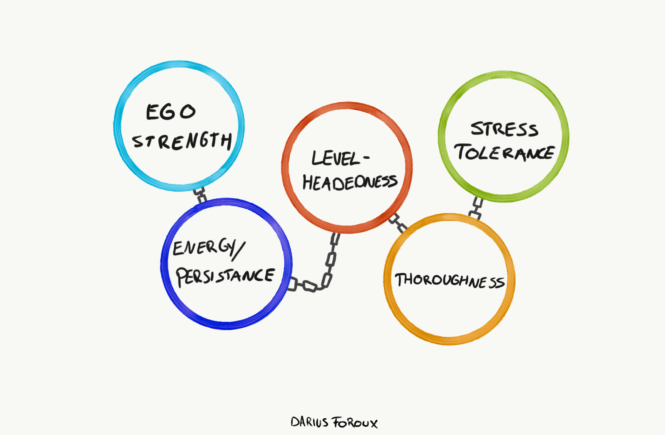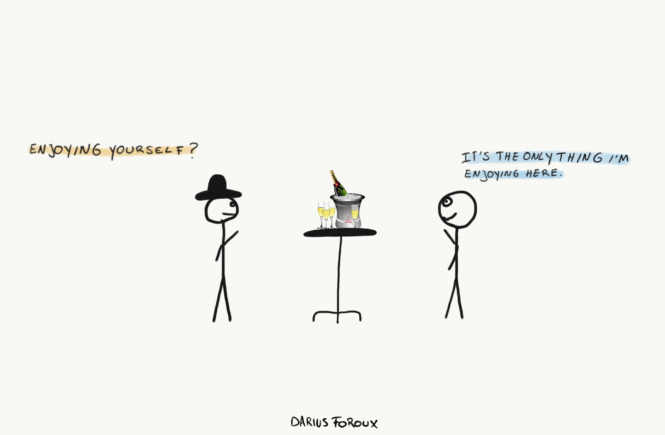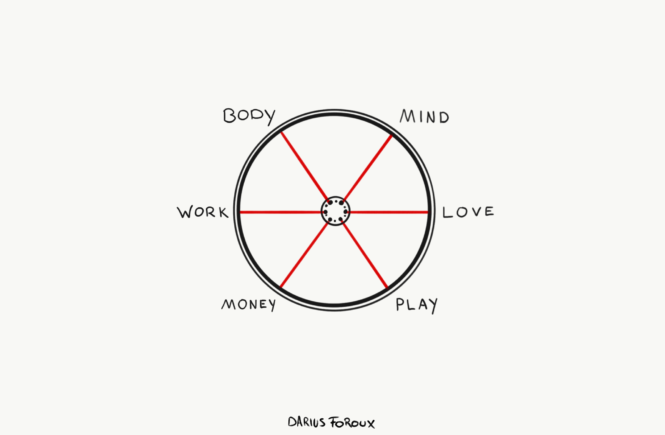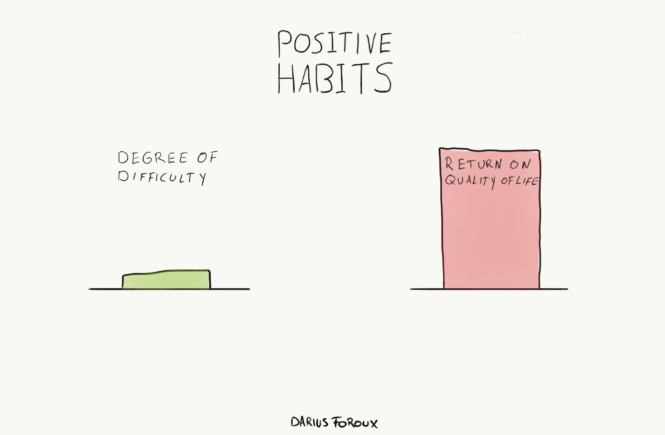Mental toughness means you’re good at dealing with the demands of life. It means you can perform under pressure. I’ve been researching this topic extensively since the start of this year.
I found a 2019 study that looked into the relationship between different personality traits that determine our mental toughness. The authors studied professional athletes and found five personality traits that were predictive of success in sports.
While these findings are not very solid or applicable to daily life, I found their list of five personality traits highly useful. We can use these traits as a guideline for gaining more mental toughness. In this article, I’ll share my take on the traits that made athletes mentally tough.
Ego-Strength
I love that the authors of the study brought up the relationship between ego and mental toughness. In my opinion, ego is a tool that we shouldn’t suppress. In the study, they define ego as “A measure of one’s capacity to handle setbacks, criticism, and rejection.”
If you score high on ego-strength, you’re less affected by failure and setbacks. If you score low, you are affected by failure, criticism, and rejection. And you’ll have a hard time bouncing back.
In recent years, the ego has received a lot of negative attention. We’ve seen public displays of hubris and ego from famous figures. Ryan Holiday even wrote a book called ‘Ego is The Enemy.” I like that book because it shows the dangers of having a big ego. But we can’t ignore that ego can also be useful. In fact, the study mentioned above shows there’s a relationship between mental toughness and ego-strength.
Here’s the lesson I’ve learned: Don’t be afraid to embrace your ego. Be more like Michael Jordan, and less like Lance Armstrong in his prime. The former used his ego-strength to win, the latter used it to destroy and manipulate others.
No matter what happens in life, you must believe in yourself. This is not woo-woo or self-help BS. Self-belief is the foundational characteristic of a good competitor.
We all fail in life. We all lose. We all face rejection and criticism. But none of that should destroy our will to keep moving forward.
Level-Headedness
Mentally tough athletes remain composed in stress-inducing situations. This is a critical trait of mental toughness. When you’re confronted with a situation that raises your heart rate, you want to avoid an emotional response.
I naturally rank low on this trait. I often got emotional during stressful situation. But at one point, I got tired of it and committed to controlling my emotions. Take it from me, if you want to be more composed, you can. You simply need to practice it. I extensively journal about keeping my composure, and I’m still not where I want to be, but I’m getting better.
No matter what people say to you, what happens to you, or what kind of situation you’re in, you should always remain level-headed. Reacting emotionally will only harm you and others.
Stress-Tolerance
This trait is about your ability to deal with high stakes. How do you deal with possible negative consequences? For example, if you have a high stress-tolerance, you’re fine with taking the final shot in a championship game.
You take the shot knowingly you probably will get an avalanche of negativity over you if you miss. I also see people with high stress tolerance in finance. Let’s say you manage millions of dollars of other people money. You can’t worry about the negative consequences too much because that will paralyze you.
This is the concept of stress tolerance. Now, in this case, I do think there’s a natural predisposition. Some people have no issue with making those types of calls. Others don’t want to be responsible.
That’s not good or bad. Not everyone needs or wants to be the person who takes the final shot. But when it comes to mental toughness, we don’t want to rank very low on stress tolerance.
I find this an important aspect of living a good life. I use ideas from ancient philosophy to avoid fear and worry. Stoicism is great for that, and so is Mindfulness. Whatever happens, never allow fear of negative consequences cripple you.
Energy/Persistence
In the study, they describe this as “A measure of one’s potential to sustain a high level of activity over extended periods.” To me, this is the biggest challenge in life and work.
Too often, our energy is up and down. As a result, we can’t be persistent, even if we want to. But most things in life require long-term effort before we see any type of payoff.
Think of learning a skill, getting a degree, building a career, writing a book, creating a movie, etc. All that stuff requires energy and persistence. In my experience, consistency is the most important thing.
It’s not about how fast you can go or how good you are at something. It’s about persistently making progress. You want to “chip away” at something. Look at it like destroying a wall. Destroy it bit by bit without wearing yourself down. If you go at it with force, you’ll only get tired—even with a sledgehammer.
The key is to manage our energy so we can stay active and persistent in overcoming our challenges.
Thoroughness
This used to be one of my biggest pitfalls. You know how people often talk nonsense on job interviews? “My biggest weakness is that I’m a perfectionist.” Yeah, right, genius! In my experience, far more people are the opposite.
We can all be more perfectionistic and thorough. I used to rush everything and often overlooked details. To some degree, I still prefer to move fast in life. Last month, I created and launched an online course in five weeks. That process usually takes twice as long.
But mental toughness is not only about doing your job—it’s about doing it well. And to succeed at anything in life, you need to be thorough. You don’t get points for doing a sloppy job.
Now, the issue is when we take things too far. But again, is there such a thing as doing a too good of a job? I don’t think so. If you look at successful people in sports and business, you see people who have an eye for detail.
One of the most famous examples is Steve Jobs. He was notorious for perfecting the inside of their products—parts that we, as users, would never see. Same was true for Apple’s manufacturing facilities. Everything needed to be spotless.
It’s a trait. It’s a way of looking at the world. People like Jobs never settle for anything less than great. I love that and take a lot of inspiration from that mindset.
Take on Challenges
People often ask me, “But HOW can I improve these traits?” Here’s my honest answer: There are no universal answers. There’s no blueprint to mental toughness. It’s not math. No one can say, “Do XYZ and you’ll be mentally tough from now on!” In my experience, awareness of these traits is enough the get the ball rolling. So if you’re looking for clear directions, I wouldn’t waste my energy too much on that.
Ultimately, none of these traits will guarantee success. That’s not what this is about. I used the above traits to describe several aspects of mental toughness. Every person has their own goal and path in life. Not everyone needs to be like Michael Jordan.
Mental toughness is also not about outcomes. It’s about challenging yourself and becoming a better—more complete—person. I hope these traits gave you enough areas to focus on. I recommend picking one or two traits you want to focus on in daily life.




